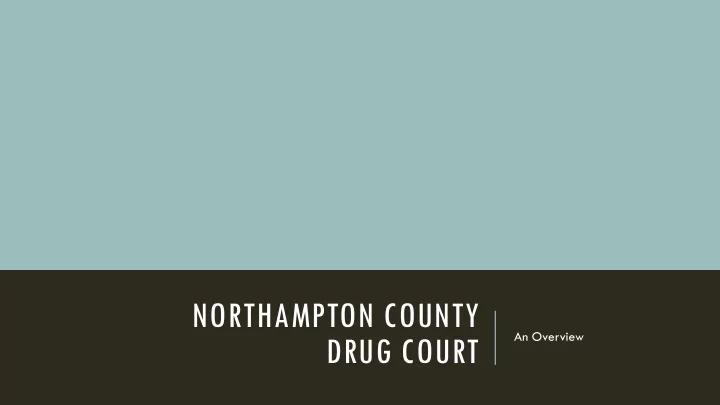

NORTHAMPTON COUNTY An Overview DRUG COURT
THE TEAM: AN INTERDISCIPLINARY APPROACH The Northampton County Drug Court Team consists of: Judge County Division of Drug and Alcohol County Division of Mental Health County Adult Probation County Public Defenders’ Office Area Outpatient Service Providers (evaluation, rehabilitation, and support) Ancillary Supports (County Prison Officials, County Department of Children, Youth and Families)
THE PROBLEM SOLVING COURT PHILOSOPHY: RESTORATIVE JUSTICE Addresses the root of an offender’s criminogenic behavior Prospective: focused on individual outcomes rather than the crime Less adversarial than traditional courts Collaborative team approach Community-based Treatment driven
THE WORK OF THE DRUG AND MENTAL HEALTH COURT TEAMS Evaluating candidates and admissions determination Monitoring participant progress through information obtained by contacts with service providers, the Probation Department, Drug & Alcohol and Mental Health case management Identifying resources to meet the treatment and ancillary needs of participants Encouraging participants’ development and exercise of positive coping mechanisms and daily living skills by the application of incentives Determining the need for and applying sanctions to deter participants’ unhealthy behavior Educating the community at large about the drug epidemic and mental illness, and the work of the Courts To raise awareness and support and to reduce stigma
THE BENEFITS OF DRUG COURT To participants: Participants are working, going to school, raising their children, and working on their recovery in their communities, where the skills they learn are immediately applicable to their everyday lives. To participating offices and agencies: The Court and human service providers have gained a greater understanding of the systems and resources that each has in place, and where there was previously no collaboration between the different entities, Drug Court has brought us together to provide better opportunities and outcomes for those involved in the criminal justice system. To the community: The community realizes a direct and indirect cost savings by a reduction in the actual costs of incarceration and the return of people to the community to work and raise their families.
PROGRAM TRACKS Track One: Post-conviction court open to eligible parole and probation violators as an alternative to incarceration A probationary sentence that includes completion of Drug Court is imposed, no incarceration 4-phase program designed to last 18 to 24 months Track Two: Direct sentence program open to eligible offenders at time of sentencing through TCAP
DRUG COURT ELIGIBILITY CRITERIA Individuals 18 years of age or older who: Reside in Northampton County; Have committed a Felony 3, Misdemeanor 1 or Misdemeanor 2 offense and have not less than 12 months sentencing exposure; Have a qualifying substance use disorder; Have no mental illness that would interfere with treatment and supervision; Have no convictions for murder, manslaughter, felony sex offenses, violent felony offenses, violent offenses committed with a firearm, or unresolved out- of-county charges.
SCREENING PROCESS Step 1: Application Review (including demographic information, addiction history, criminal history, military history – if any) Step 2: Drug and Alcohol Evaluation Step 3: Review of Any Supervision History Step 4: Team Discussion Step 5: (optional) Applicant observation of Reinforcement Hearing, appearance before court Step 6: Team Decision
PROGRAM FEATURES: SUPERVISION Phase One: Phase Two: Phase Three: Phase Four: • Electronic • Weekly contact • Weekly contact • Bi-weekly contact with SPO monitoring with SPO with SPO • Bi-weekly • Curfew • Weekly • Monthly Reinforcement Reinforcement Reinforcement • Weekly Hearings Hearings Hearings Reinforcement • Drug testing twice Hearings • Drug testing twice • Drug testing twice per week per week per week • Weekly contact with SPO • Drug testing twice per week
PROGRAM FEATURES: PARTICIPANT PROGRESS Phase One: Phase Two: Phase Three: Phase Four: • Obtain daily self-help • Attend self-help • Attend self-help • Attend self-help meetings meetings as directed meetings as directed meetings as directed • Obtain temporary • Select sponsor and • Maintain work/school • Maintain work/school sponsor home group • Maintain/obtain • Maintain housing • Obtain stable, sober • Obtain employment independent sober • Obtain GED (if housing or enroll in school housing applicable and not previously (FT/PT combined) obtained) • 30 consecutive days • 90 consecutive days • 60 consecutive days sober in community sober in community • Pay off or continue sober in community making consistent • Continue paying costs payments on costs and • Begin paying costs and fines fines and fines
PHASE ADVANCEMENT AND GRADUATION Phase Advancement Requirements: Graduation Requirements: • Complete a Phase Advancement Application • Successfully complete all recommended identifying progress, barriers to progress and treatment needs • Attain a minimum of 9 months’ sobriety in the • Write and read an essay in open court on a community designated recovery topic • Maintain gainful, consistent employment, or • Have met all the requirements of the phase vocational or academic program • Maintain clean, sober, stable home • Complete payment of costs and fines or have payment plan in place • Present Graduation Project in Court
THE BENEFITS OF DRUG COURT Reduction in Recidivism Rates According to the National Association of Drug Court Professionals: • The 1-year recidivism rate for Drug Court graduates is only 16%, and the 2-year rate is only 27% • By comparison, the national recidivism rate among imprisoned drug users is 60-80% nationwide Better Individual and Community Outcomes • Drug Court participants are six times more likely than others to succeed in drug treatment Reduction in Costs to the County • Based on the prison’s current per diem and an average six month sentence for a level 2 -4 offender, Drug Court results in a savings of $17,906.40 per participant • Drug Court has saved approximately 4,138 prison days, resulting in an estimated cost savings of $423,386.88 • Criminal Division has collected over $17,813.15 on all cases under the supervision of the Drug Court
Recommend
More recommend